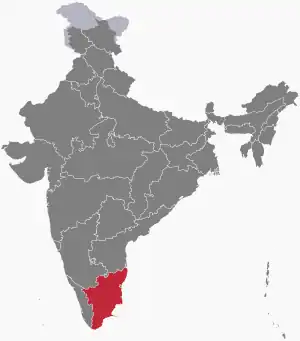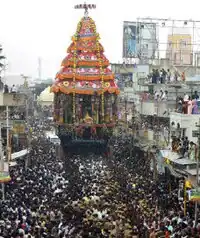
The following outline is provided as an overview of and topical guide to Tamil Nadu:
Tamil Nadu – state in South India. Tamil Nadu covers an area of 130,058 km2 (50,216 sq mi), and is the eleventh largest state in India. The bordering states are Kerala to the west, Karnataka to the north west and Andhra Pradesh to the north. To the east is the Bay of Bengal and the state encircles the union territory of Puducherry. The southernmost tip of the Indian Peninsula is Kanyakumari which is the meeting point of the Arabian Sea, the Bay of Bengal, and the Indian Ocean. When India became independent in 1947, Madras presidency became Madras state, comprising present-day Tamil Nadu, coastal Andhra Pradesh up to Ganjam district in Orissa, South Canara district Karnataka, and parts of Kerala. The state was subsequently split up along linguistic lines. In 1969, Madras State was renamed Tamil Nadu, meaning "Tamil country".
General reference
Names
- Common name: Tamil Nadu
- Native name = தமிழ்நாடு
- Pronunciation: /tæmɪl nɑːduː/ TAM-il-NAH-doo; Tamil: தமிழ்நாடு, Tamiḻnātu; ⓘ
- Originally known as : Madras State Established in 1773; Madras State was formed in 1950 and renamed as Tamil Nadu on 14 January 1969[1]
- Official name: Tamil Nadu
- Nicknames
- Adjectivals
- Demonyms
- Abbreviations and name codes
Rankings (amongst India's states)
- by population: 6th
- by area (2011 census): 11th
- by crime rate (2015): 7th
- by gross domestic product (GDP) (2014): 2nd
- by Human Development Index (HDI):
- by life expectancy at birth:
- by literacy rate:
Geography of Tamil Nadu

- Tamil Nadu is: an Indian state
- Population of Tamil Nadu:
- Area of Tamil Nadu:
- Atlas of Tamil Nadu
Location of Tamil Nadu
- Tamil Nadu is situated within the following regions:
- Time zone: Indian Standard Time (UTC+05:30)
Environment of Tamil Nadu
- Climate of Tamil Nadu
- Protected areas of Tamil Nadu (see below)
- Wildlife of Tamil Nadu
- Flora of Tamil Nadu
- Fauna of Tamil Nadu
Natural geographic features of Tamil Nadu
- Lakes of Tamil Nadu
- Mountains of Tamil Nadu
- Rivers of Tamil Nadu
Protected areas of Tamil Nadu
Biosphere reserves
Two of the three biosphere reserves in Tamil Nadu are among four in India and ninety five in Asia that are part of UNESCO's Programme on Man and the Biosphere (MAB).
The 3 Biosphere Reserves in Tamil Nadu listed by size are:
National parks
of Tamil Nadu
Tamil Nadu has 5 declared National Parks with a total area over 307.84 km2 (118.86 sq mi), covering only 0.24% of the state. This is the third lowest % area covered of all Indian states and Union territories.[3]
- Indira Gandhi National Park
- Mudumalai National Park
- Mukurthi National Park
- Gulf of Mannar Marine National Park
- Guindy National Park[4]
- Palani Hills National Park
Wildlife sanctuaries
Wildlife sanctuaries in India – there are 7 wildlife sanctuaries plus 13 bird sanctuaries that together cover over 2,997.60 km2 (1,157.38 sq mi), 2.30% of the total state area.[5]
- Grizzled Squirrel Wildlife Sanctuary
- Indira Gandhi Wildlife Sanctuary
- Kalakkad Wildlife Sanctuary
- Mundanthurai Sanctuary
- Kanyakumari Wildlife Sanctuary
- Mudumalai Wildlife Sanctuary
- Vallanadu Wildlife Sanctuary
- Sathyamangalam Wildlife Sanctuary[6][7]
| ||||||
Elephant reserves
Tamil Nadu is a major participant in Project Elephant.[9]
- Nilgiri Elephant Reserve
- Coimbatore Elephant Reserve
- Anamalai Elephant Reserve
- Srivilliputtur Elephant Reserve
- Rejuvenation Camp for Temple and Private Elephants of Tamil Nadu[10]
Tiger reserves
Tamil Nadu has 4 tiger reserves which are declared as part of Project Tiger:
- Kalakkad Mundanthurai Tiger Reserve[11][12]
- Mudumalai National Park[13]
- Annamalai-Parambikulam Tiger Reserve[14]
- Sathyamangalam Wildlife Sanctuary
The state has 2 other significant tiger habitats:
Bird sanctuaries
There are 13 established bird sanctuaries at the southernmost continental range of the Central Asian Flyway in Tamil Nandu.[16][17]
- Chitrangudi Bird Sanctuary[18]
- Kanjirankulam Bird Sanctuary
- Karaivetti Bird Sanctuary
- Karikili Bird Sanctuary
- Koothankulam Bird Sanctuary
- Melaselvanur - Kilaselvanur Bird Sanctuary[19]
- Point Calimere Wildlife and Bird Sanctuary
- Pulicat Lake Bird Sanctuary
- Vaduvoor Bird Sanctuary[20]
- Vedanthangal Bird Sanctuary
- Vellode Birds Sanctuary
- Vettangudi Bird Sanctuary
- Viralimalai Peacock Sanctuary[21][22]
- Kallaperambur lake [23]
- Suchindram Theroor Birds Sanctuary
Regions of Tamil Nadu
Ecoregions of Tamil Nadu
Ecoregions in Tamil Nadu
Administrative divisions of Tamil Nadu
Administrative divisions of Tamil Nadu
- Districts of Tamil Nadu
- Municipalities of Tamil Nadu
Districts of Tamil Nadu
Municipalities of Tamil Nadu
Municipalities of Tamil Nadu
- Capital of Tamil Nadu: Capital of Tamil Nadu
- Cities of Tamil Nadu
Demography of Tamil Nadu
Government and politics of Tamil Nadu

- Form of government: Indian state government (parliamentary system of representative democracy)
- Capital of Tamil Nadu: chennai
- Elections in Tamil Nadu
- (specific elections)
Union government in Tamil Nadu
Branches of the government of Tamil Nadu
Executive branch of the government of Tamil Nadu
Legislative branch of the government of Tamil Nadu
Judicial branch of the government of Tamil Nadu
Law and order in Tamil Nadu
- Law enforcement in Tamil Nadu
History of Tamil Nadu
History of Tamil Nadu, by period
Prehistoric Tamil Nadu
Ancient Tamil Nadu
Medieval Tamil Nadu
Colonial Tamil Nadu
Contemporary Tamil Nadu
History of Tamil Nadu, by region
History of Tamil Nadu, by subject
Culture of Tamil Nadu
- Architecture of Tamil Nadu
- Cuisine of Tamil Nadu
- Languages of Tamil Nadu
- Monuments in Tamil Nadu
- World Heritage Sites in Tamil Nadu
Art in Tamil Nadu
Literature of Tamil Nadu
Music of Tamil Nadu
Festivals in Tamil Nadu
People of Tamil Nadu
Religion in Tamil Nadu
Sports in Tamil Nadu
- Cricket in Tamil Nadu
- Football in Tamil Nadu
Symbols of Tamil Nadu
- Animal: Nilgiri Tahr
- Bird: Emerald Dove
- Dance: Bharatanatyam
- Fish:
- Flower: Gloriosa Lily
- Motto: (Tamil: வாய்மையே வெல்லும், romanized: Vaimaiye Vellum)
- Seal of Tamil Nadu
- Song: "Invocation to Tamil Mother"
- Sport: Sadugudu
- Tree: Palm Tree
Economy and infrastructure of Tamil Nadu
Education in Tamil Nadu
Health in Tamil Nadu
Health in Tamil Nadu
See also
References
- ↑ Tamil Nadu Legislative Assembly history 2012.
- ↑ Tamil nadu Forest Dept., Retrieved 9/9/2007 Biosphere Reserves
- ↑ Wildlife Institute of India, National Wildlife Database (November 2006), retrieved 3/25/2007 National Parks Archived 2008-06-22 at the Wayback Machine
- ↑ Tamil Nadu Forest Dept., Retrieved 9/9/2007 National Parks
- ↑ National Wildlife Data Center (June 2008). "State-wise break up of Wildlife Sanctuaries". Wildlife Institute of India. Retrieved 26 March 2007.
- ↑ "Sathyamangalam forests declared as sanctuary". The Hindu. Chennai, India. 24 December 2008. Archived from the original on 7 November 2012. Retrieved 14 April 2009.
- 1 2 B. Aravind Kumar (27 September 2011). "Sathyamangalam wildlife sanctuary expanded to 1.41 lakh hectares". The Hindi, Chennai. Kasturi & Sons Ltd. Retrieved 27 September 2011.
- ↑ "Tamil Nadu Forest Department". Forests.tn.nic.in. Archived from the original on 21 April 2017. Retrieved 8 April 2013.
- ↑ Asian Nature Conservation Foundation, Maps & Data.Forest Divisions of South India bearing Elephants Archived 2008-03-15 at the Wayback Machine
- ↑ Tamil Nadu Forest Dept.Rehabilitation and Rescue Centre for the Temple, Private and Rescued Elephants Archived 2011-09-30 at the Wayback Machine
- ↑ Ashoka Trust for Research in Ecology and the Environment Community interventions in Kalakad Mundanthurai Tiger Reserve Archived 2007-03-15 at the Wayback Machine
- ↑ Johnsingh, A. J. T., Wildlife Institute of India, "The Kalakad–Mundanthurai Tiger Reserve: A global heritage of biological diversity", Current Science, VOL. 80, NO. 3, 10 February 2001.Kalakad–Mundanthurai Tiger Reserve Archived 2013-05-11 at the Wayback Machine
- ↑ Murari, S. (31 December 2008). "Thousands Protest Against Indian Tiger Reserve". Planet Ark. Reuters. Archived from the original on 16 July 2011. Retrieved 30 October 2009.
- ↑ "Eight New Tiger Reserves". Press Release. Ministry of Environment and Forests, Press Information Bureau, Govt. of India. 13 November 2008. Retrieved 31 October 2009.
- ↑ "Sathyamangalam forests declared as sanctuary". The Hindu. Chennai, India. 24 December 2008. Archived from the original on 7 November 2012. Retrieved 14 April 2009.
- ↑ Tamil Nadu Department of Environment (2006) State of the Environment, retrieved 9/9/2007, Report Archived 2010-09-24 at the Wayback Machine
- ↑ Tamil Nadu Forest Dept., Bird sanctuaries
- ↑ UNEP
- ↑ Migratory birds flock to Vettangudi Sanctuary, The Hindu, 9/11/2005, Hinduonnet.com[usurped], Vettangudi
- ↑ Tamil Nadu Forest Dept., Bird Sanctuaries in Tamil Nadu Vaduvoor Archived 2013-10-21 at the Wayback Machine
- ↑ Tamildnadu Tourism Development Corporation and Department of Tourism, retrieved 5/21/2007 Viralimalai Sanctuaries Archived 2008-03-15 at the Wayback Machine
- ↑ Rural Development and Panchayat Raj (PR.2) Department, G.O. (Ms) No.19, Dated: 23.1.2008 TNRD.gov.in, Declaring Viralimalai as a heritage place
- ↑ The Hindu, Hindu.com, 15 December 2005





